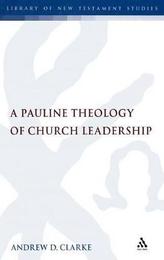
|
A Pauline Theology of Church Leadership
Hardback
Main Details
| Title |
A Pauline Theology of Church Leadership
|
| Authors and Contributors |
By (author) Andrew D. Clarke
|
| Series | The Library of New Testament Studies |
|---|
| Physical Properties |
| Format:Hardback | | Pages:220 | | Dimensions(mm): Height 234,Width 156 |
|
| ISBN/Barcode |
9780567045607
|
| Classifications | Dewey:253.2 |
|---|
| Audience | | Professional & Vocational | |
|---|
|
Publishing Details |
| Publisher |
Bloomsbury Publishing PLC
|
| Imprint |
T.& T.Clark Ltd
|
| Publication Date |
29 November 2007 |
| Publication Country |
United Kingdom
|
Description
Scholarly studies consider Paul's views on leadership tend to fall into one of three camps: 1) the historical development view, which in large measure identifies developments in church practice with developments in Pauline and deutero-Pauline ecclesiology; 2) the synchronic, historical reconstruction, typically making use of Graeco-Roman, social context sources, or social-scientific modelling, focusing on a single congregation, and sometimes distinguishing between the situation to which Paul was responding and the pattern he sought to impose; and 3) the theological/hermeneutical analysis, identifying Paul's particular approach to power and authority, often independently of any detailed reconstruction of the situations to which Paul was responding. Andrew Clarke has explored in an earlier work, Serve the Community of the Church (Eerdmans, 2000), the distinctive, local and historical situations in the various Pauline communities and concluded that there is no evidence that they organised themselves according to a common set of governmental structures which clearly developed with the passage of time. Rather each community was influenced by its own localized, social and cultural context. The present project builds on this, and necessarily focuses on leadership style rather than church order. It seeks to recover from Paul's critical responses, his generic ethos of church leadership, including the ideal qualities, characteristics and task of leaders and the nature of appropriate interaction and engagement with church members. In the light of current, theoretical discussions about power and gender, the study focuses particularly on Paul's attitude towards hierarchy, egalitarianism, authority, responsibility and privilege.
Author Biography
Andrew Clarke is Senior Lecturer in New Testament at the University of Aberdeen. His other books include: Secular and Christian Leadership in Corinth: A Socio-Historical and Exegetical Study of 1 Corinthians 1-6 (Leiden: Brill, 1993), and Serve the Community of the Church: Christians as Leaders and Ministers (Grand Rapids: Eerdmans, 2000).
ReviewsReview in International Review of Biblical Studies, vol. 54:2007/08 "A fascinating new monograph [in which] he addresses the impact of Paul's views on leadership within the parameters of the early Christian communities that he planted, as well as the impact thereof on Paul's ecclesiology." Library of New Testament Studies, October 2008 German review in Theologische Literaturzeitung, 2009 "This study extends Clarke's previous work on leadership in the early church...This is a far more wide-ranging study , and assesses the whole Pauline corpus to address the issue of the way Paul's understandings of leadership's impact on his conceptions of ecclesiology. This work reflects the mature thought of a scholar who has wrestled with questions of Pauline leadership throughout his academic and pastoral career and readers wil benefit from the insights offered" Expository Times Vol.119 No.10 July 2008 Reviewed by John Drane, Theological Book Review Vol.20 No.2 2008 "Clarke's theological analysis of Pauline leadership is recommended for anybody interested in the topic ... A Pauline Theology of Church Leadership fills an important gap in contemporary scholarship by collating the fundamental teachings of Paul on an important ecclesiologial theme ... Clarke's compilation of Pauline leadership principles is an excellent contribution in many ways. His awareness of significant tensions within both the Pauline literature and contemporary scholarship deeply informs his theological queries. Moreover, Clarke's expertise in NT social history surfaces throughout as he illuminates many details pertaining to the original context of Paul's letters. Finally, Clarke's analyses of concepts such as power, rhetoric and imitation demonstrate his attentiveness to the inner workings of the apostle, which have previously been overlooked in shallower theologies ... Clarke has produced an erudite and thought-provoking volume which will be a tremendous resource for any scholar, pastor, or student interested in this topic." John K. Goodrich, European Journal of Theology, XVII 2008 -- J.K. Goodrich * European Journal of Theology * "expert, wide ranging and judicious" Journal for the Study of the New Testament Booklist 2009 -- David Wenham * Journal for the Study of the New Testament * "This work makes a positive contribution in the area of Pauline ecclesiology. Clarke presents a nuanced work that takes into consideration much of the literature written from a critical perspective on Paul and his churches. He also bases his views upon a historical reconstruction that takes into account the relevant data from Paul's letters as well as current information gained by historical and sociological studies." -- Benjamin L. Merkle, Baptist Theological Seminary, Journal of the Evangelical Theological Society -- Benjamin L. Merkle, Baptist Theological Seminary * Journal of Evangelical Theological Society * 'In this fascinating new monograph Andrew Clarke addresses the impact of Paul's view on leadership within the parameters of the early Christian communities that he planted, as well as the impact thereof on Paul's ecclesiology' Stephan Joubert, University of Pretoria, South Africa RBL 10/2008 -- Stephan Joubert * Review of Biblical Literature *
|